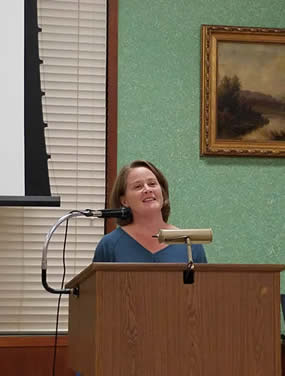
On September 24, members and friends of our local community joined us for the fourth Dr. J. T.Vincent Lou Lecture, “Diversity is Our Strength.” Jeannine Hill Fletcher, Th.D., Professor of Theology, Fordham University, took us on a thought-provoking journey through our long history as a nation wrestling with issues of racial justice and religious freedom. Citing the motto of the Great Seal of the United States, e pluribus unum (“one out of many”), Dr. Fletcher reminded the audience that the original vision of our founders was a nation created by the diversity of our people, yet the pattern has been to diminish that vision in favor of one religion and one set of people above others. “Instead of a nation that flourished in difference,” she said, “we became a nation that floundered under the sin of white supremacy. And in each era of failings, it was Christians who failed by the criteria of our own measure, that we love one another….For nearly 250 years, white Christians reasoned with their scriptures that God had ordained the servitude of slavery for their African sisters and brothers. In this tragic era of Christian history, it was white Christians who stole human beings from their homes, shipped them as cargo, and condemned them to perpetual servitude.”
In addition to assuming responsibility for the theological reasoning that devastated the people of Africa in our country, Dr. Fletcher suggested that it is also important to acknowledge that slavery was a financial crime where “the lifeblood and livelihood of countless enslaved persons was converted to economic resources for the wellbeing of white owners and white institutions that continue today.”
Dr. Fletcher emphasized the long-standing role of many leading Christian thinkers, ministers, and statesmen in perpetuating the notion that “God’s plan” included enslavement, dispossession and extinction of non-white people, and extraction of labor from people of color while denying them the full benefits of U.S. citizenship. This notion, according to Dr. Fletcher, has been evident in various moments in our history, including the Supreme Court decision establishing that European Christian nations’ right of discovery superseded the original nations’ right to occupancy; the exclusion from the Social Security Act’s safety net of categories of workers comprised by a vast number of workers of color; and the United States’ approval of the Federal Housing Administration’s use of racial coding for the distribution of mortgages.
Concerned that our present moment seems to repeat elements of previous chapters of our history, Dr. Fletcher prompted the audience to ask themselves, “How do we get Catholics to say, ‘our faith calls us toward the common good, calls us toward the poorer and vulnerable?’ How many congregations have bubbled over with absolute outrage at the white supremacy in this country?… When we can see the weight of white supremacy in our legislation and history, when we recognize the sedimentation of racial inequality, we might realize that it’s not enough for Christians simply to be not racist as we seek and strive for the common good. It’s just not enough. One has to be anti-racist. We need to find practices that actively and consistently aim to undo the racism that has been built into the fabric of our nation.”
Building on the fundamental idea that the Christian tradition is grounded in the teaching of loving one another, Dr. Fletcher stated that Catholic social teaching, which aims for all God’s children to have an equal share in the blessings of our earth, is fundamentally anti-supremacist and anti-racist. “If we can see the roots of the problems of white supremacy in Christian failing to love, we might mobilize Christians to renew their efforts across religious and racial lines, to mobilize our Christian tradition to recreate a nation of one out of many. And this would be my proposal in the end, that the very principles of Catholic social thought might be resources for addressing our epic failures to love, that Catholics and Christians might once again be guided by the prophetic vision of Jesus in the creation of a Kingdom of Love within our very nation.”
In a statement that reflected the sentiment of other members of the audience, Craig Martin, Ph.D., Professor of Religious Studies, St. Thomas Aquinas College, said, “Dr. Fletcher’s summary of the history of Christian white supremacy in the U.S. was perfect for preparing us for one of the most urgent tasks we face today: the task of attending to those parts of our public discourse that have historically reinforced a racial hierarchy, insofar as identifying them is the first step toward eliminating them and correcting for their ongoing harmful effects.”
The entire lecture is available for viewing HERE
